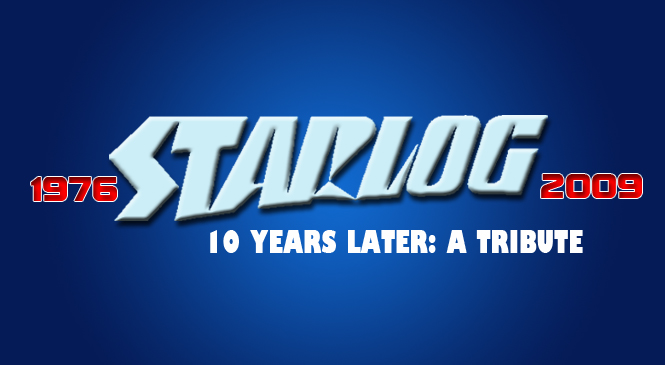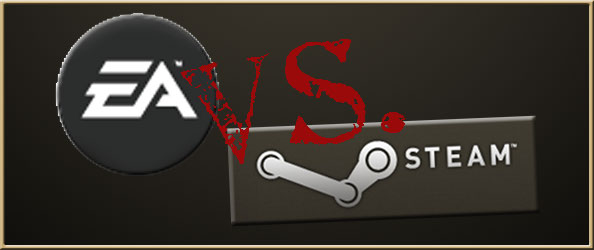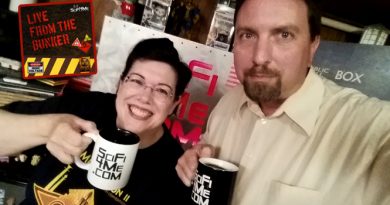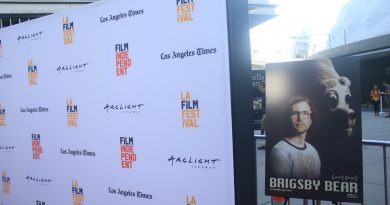Ian Spelling: “It All Ties Back to STARLOG”

[all photos courtesy Ian Spelling]
Ian Spelling is in a t-shirt and sweatpants, with his feet up on his desk, as he talks about his career as a freelance writer. It’s been a long and varied journey since his college days, and it all started with Starlog.
“That’s an interesting and apologetically told very long story. The shortest version is: I was in college and I was looking for outlets to write for, and science fiction, fantasy were the things I happened to like the most – and horror, actually – I originally approached the Fango Starlog Group about writing for Fangoria.”
Spelling had met editor Tony Timpone at a convention in New York, but Timpone had a full writing staff and suggested going over to Starlog. “And so I sent Dave [McDonnell] a couple of my pitches. I happened to have an interview that I had done with Tahnee Welch for the movie Cocoon, and apparently Dave had everything he needed from Cocoon except Tahnee Welch. And so he called me at my college dorm and said, ‘I’ll buy your piece.’ And that was my in at Starlog.”
At the time, Spelling had been hitting the press junkets as part of his work for the Albany Student Press at SUNY Albany. Many of the interviews he had done went unused by the ASP, so he ended up pitching the ones that would best fit Starlog to editor Dave McDonnell. “I just kept after Dave. I did a piece, I interviewed Gene Roddenberry for my college newspaper, and Dave was like, ‘You know what? I’ll take that, too.’ So I did a piece on that. I had met Majel Barrett at a Star Trek convention. She sat with me and did this interview there for ten or fifteen minutes, and Dave bought that as a sidebar.”
The Roddenberry interview comes with its own tale: “I met Mr. Roddenberry (at the same convention where I talked to Majel). He said, ‘Nice to meet you. I would love to talk to you for your college newspaper, but I can’t do it right now.’ He handed me his business card and he said, “Call my assistant. I will tell her to expect your call, and we will do an interview.” Next thing I know, I get back to Albany, and I called the office, and she says, “Yep, I’m expecting your call. Let’s do it on this date at this time.” Great.”
Then, a snag: Roddenberry had to cancel to go to a friend’s funeral. Spelling says he got a note on his dorm room door with the Star Trek creator’s direct phone number. “And I go back to my college paper’s office because to call California was like two dollars a minute, or something like that, back in the 1980s, and I called him directly. He said, ‘Hang up the phone. I’m gonna call you so that you’re not paying for this phone call.’ And he talked to me for almost an hour. I was some college kid. This was the Albany Student Press, circulation of about twelve thousand. And he was great, couldn’t have been nicer. Paramount sent me come cool photos to run with the interview in our college newspaper, and I sold that same interview to Starlog.” That interview cemented Spelling’s relationship with Starlog, which lasted until the magazine went out of print in 2009.
But funnily enough, Spelling was never on the staff. “I was always a freelancer for Starlog. But I was in constantly, because I lived in Manhattan and then when I got married, I moved to Hoboken for little while, but then we were back in New York City and I lived on 40th between 1st and 2nd. So I was still, all the time, at the magazine.” His first place, his “bachelor pad”, was just a couple of blocks away from Starlog‘s offices on Park Avenue. And then he got a job in the building directly across the street. “I was up at the office all the time. I’d kill time there. I’d go up, I’d be proofreading articles by me, in some cases by other people. Eyeballing stories and helping out.
“Here’s the other crazy thing: Starlog, if I remember correctly, was on the eighth floor at 475 Park Avenue South. My wife ended up working on the fifth floor at 475 Park Avenue South. So I was in the building constantly. You may as well have had a chair for me at Starlog’s offices. That’s how often I was there.”
Speaking of the wife, what did she think about all of this fandom activity? “I graduated college in ’87 and I went into public relations. And I was doing the PR as my 9-to-5 job and the writing as my 5-to-9 job. And my wife basically said to me, ‘Honey, I love you but we’re gonna get divorced. You’re literally working two jobs.’ And I said, ‘OK.’ She said, ‘So pick one.’ But what would you do if you were me? Shirt and tie, sometimes a suit, shoes at a PR job or work from home, t-shirt, sweatpants, and write freelance? So I chose to go freelance and that was in 1997. And I’m sitting here chatting with you in a pair of sweatpants with my feet up on my desk at my home here in New Jersey, still freelancing all these years later. So it’s twenty-two years as a full-time freelancer, and I give all credit to everything with Starlog for kind of putting me on that path.”
Ironically, while Mrs. Spelling was not much of a Star Trek fan, she did get “pretty friendly at one point with George Takei” after Spelling brought the actor in for a PR event. Takei was also among the roster of Trek actors that Spelling interviewed for his college paper. The list includes Mark Lenard and Walter Koenig in additional to Takei. “They were all lovely and just said, ‘Sure kid. I’ll talk to you.'”
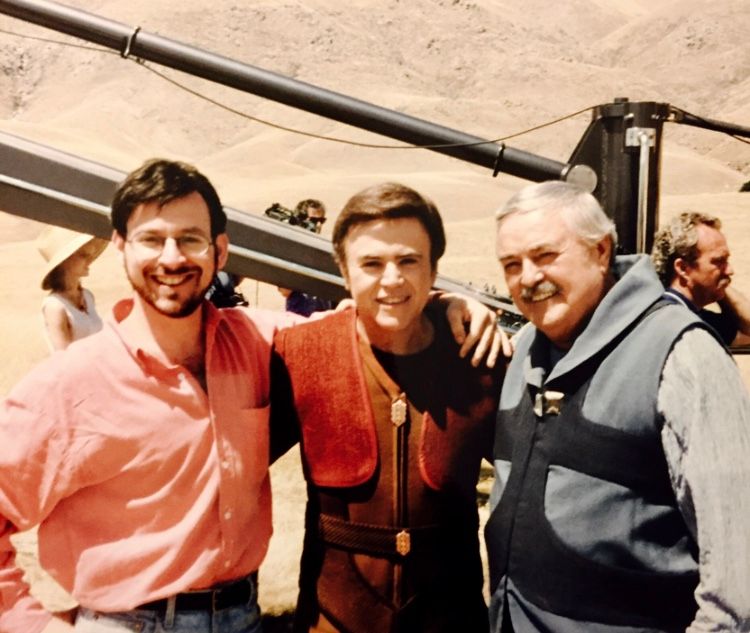
Throughout his days at Starlog, Spelling would be in the offices quite a bit, regularly pitching ideas to McDonnell and having him ask for specific material. “He and I would usually go to lunch every week or two when I was living in the city. And when I moved up to New Jersey in 2000, I was still in Manhattan all the time, and we would meet for lunch at least once every two or three weeks. So we would sit down and go over things that he wanted for stories, and I would say, ‘Do you want me to pitch this? Do you want me to pitch you that?’ In some cases, he’d call, or e-mail later on, and say (for example) ‘Roswell. Can you get anything on Roswell?’ And I would pick up the phone or send an e-mail to the WB at the time and say, ‘What have you got? Who can we interview?’
“I think I gave Dave what he wanted and needed. I never felt that he heavily edited me or rewrote me,” Spelling says of his editor. A lot of guidance for articles came in the form of notes on the assignment sheets, and these could come not only from McDonnell, but the other editors in the office.
One thing that didn’t happen was for McDonnell to put his voice into every article the magazine published. “My philosophy as a writer is: I prefer to let my subject do the talking, so I will set things up, I’ll give — if it’s a set visit or an in-person interview, I’ll set the scene, but then I let my interviewee talk. For better or for worse, that’s what I’ve always done, and I still do it to this day.” Others at Starlog wrote with a different style, some preferring to set up interviews in a Q&A format, others using quotes to buttress up the writing of the article. But, Spelling says, McDonnell “didn’t make Starlog one voice. Every writer’s voice was what you saw on the pages. Dave did not go in and ‘Dave-ify’ all the pieces, and I personally always appreciated that.”
All of that time at Starlog, in addition to his college newspaper work, led to a wide variety of opportunities to write for various outlets over the years. And then it came full circle in 2009, when CBS Consumer Products decided to revamp and relaunch StarTrek.com in the wake of the successful reboot film by J.J. Abrams. They needed someone to edit the new site. “They were interviewing a ton of people, and I went in and did an interview and said I had worked with Starlog, I’d written for all of the official magazines, and at that point Starlog had just gone out of business about a year earlier.” The right people remembered his work covering Star Trek for so many years and recommended Spelling for the job, which he held from 2010 until just a few weeks ago. “So no doubt, if you just connect the pieces, it all ties back to Starlog.”
The editing gig at StarTrek.com also meant that the tables got turned between Spelling and his former boss, Dave McDonnell. “I got him to write for StarTrek.com. He wrote probably thirty to forty pieces for me over the past several years.” That connection — and friendship — continues to this day.
And speaking of things coming full circle, when the subject of the revived Fangoria comes up, Spelling says, “It looks good! I’m glad they have Tony [Timpone] back in kind of an advisory role. It’s exciting that it exists again… For sci-fi folks, Starlog was it. For horror fans, Fango was it. Again, it was the funniest thing, if you had said to me, which did you want to write for, initially I really wanted to write for Fangoria. So I’m thrilled that it’s back, and if that paves the way for Starlog to return, too, I would be ecstatic. And if your next question is, ‘would you be interested in writing for the new Starlog, if it ever happened?’ the answer is ‘hell, yeah, of course!’ A) I hope it happens, and B) if it does happen, they know where to find me.”
[Editor’s note: this article has been updated to correct Paramount to CBS Consumer Products in connection with StarTrek.com, and has additional clarifications added in quotes from Mr. Spelling.]
![]()

